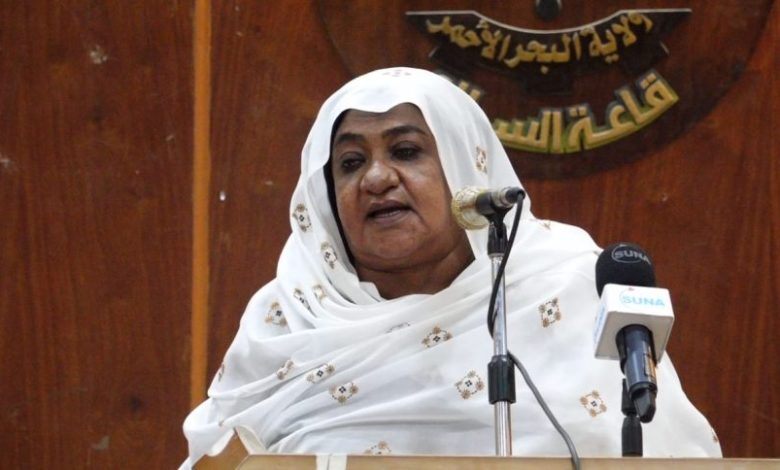Nile River Investment Forum: Expectations of Attracting Massive Investments to the State

Report by: Rehab Abdullah
The Nile River State will host the first Investment and Industry Forum in the city of Atbara on Tuesday, which will be attended by the member of the Sovereign Council, Engineer Ibrahim Jaber, alongside a large official presence from the federal government, several state governors, ambassadors from friendly and brotherly countries, and the participation of more than 120 national and international companies and institutions.
Expected Success:
The acting Minister of Industry, Mahasen Ali Yaqoub, expressed her expectation in an interview with (Al-Ahdath) that the Nile River Investment and Industry Forum would achieve unprecedented success, especially after the significant victories achieved by the armed forces and supporting forces. She stated that the forum is a great opportunity to showcase the investment opportunities in the state and national industries. She confirmed that Nile River State has become a destination for industrial investors due to factors such as the availability of basic infrastructure, including electricity and water, land grants for investment, in addition to agricultural and mineral lands, both metallic and non-metallic. She added, “Nile River State is rich in many resources.” She also praised the state government for organizing the forum amidst exceptional circumstances.
A Promising State:
Economic expert Dr. Mohamed Al-Nayer confirmed the significant economic importance of investment forums as they address the issues facing investment and industry in the state. He added that Nile River State is one of the promising and attractive states for investment, with vast investment potentials in education, agriculture, and industry.
The Largest Gold-Producing State:
Al-Nayer, in his conversation with (Al-Ahdath), pointed out that Nile River State is the largest gold producer, which he believes creates substantial investment opportunities in education. He noted that the state is open for both domestic and foreign investment, in addition to having large opportunities in the industrial and agricultural sectors, as well as being one of the stable and safe states.
Presenting the Investment Map:
Al-Nayer emphasized that the forum should present available investment opportunities across all fields. He stressed the need for an investment map to be shared during the forum to identify the state’s needs in various sectors, thus enabling feasibility studies for the necessary projects. He mentioned that this map could be updated in the future. Al-Nayer also highlighted the importance of focusing on the national private sector during the current phase, noting that attracting foreign investment may be difficult at the moment. However, he mentioned there is interest from Russia, China, and other countries that could invest under these circumstances as long as the investment areas are safe and free from issues.
Investment Distribution:
Al-Nayer called for preparation for the post-war phase and the organization of a larger forum to attract foreign investment, with the possibility of holding external meetings in coordination with the central government and other states. He pointed out the importance of learning from past mistakes and avoiding concentrating investments only in Khartoum and a few other states. Therefore, it is necessary to focus on widely distributing investments. He emphasized that Nile River State has many advantages that enable it to attract investments on a large scale.
A Key Pillar:
Dr. Ajeeb Mohamed Madani, Coordinator of the Policy Unit at the Technical Secretariat for Food Security, stated in an interview with (Al-Ahdath) that investment is the main pillar for the economy and development in general. He commended Nile River State for hosting the investment forum, particularly because the state possesses vast resources, including natural and human resources, minerals, tourism potentials, and a strategic geographic location linking it to most Sudanese states and ports on the sea.
Ajeeb stressed that the state’s maximum benefit from this forum depends on creating a comprehensive investment map for projects across various sectors such as industry, agriculture, minerals, and services. He added that Nile River State has agricultural land suitable for cultivation, close to ten million acres, with abundant water resources. However, he noted that only a third of this land is currently in use. He emphasized that the state must take advantage of this forum to present ready-to-invest projects, especially since the state has experience in providing agricultural projects with center pivot irrigation, including the Food Security Project and the New Manasir Project, which have been successful and attracted several investors. He urged the state to continue and expand these projects.
Transformative Industries:
Ajeeb also pointed out that agriculture needs processing industries to benefit from raw agricultural products, especially since the state has a wide range of crops, particularly in orchards and field crops. He emphasized the need to present projects in this area, citing the successful experience of the Japanese JICA Agency in the state, which introduced dryers that have been well received by farmers and some investors. He added, “We need to focus on transformative industries to add value to our agricultural and animal products.”
Reviewing Investment Laws:
Ajeeb called for more serious efforts to make the investment environment attractive for those interested in entering these sectors by reviewing the state’s investment laws to make them more flexible and appealing. This includes removing all barriers and simplifying procedures, as well as improving infrastructure such as roads, electricity, and irrigation systems. He also stressed the importance of effective coordination between different bodies and the establishment of a unified window to streamline procedures.



